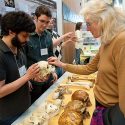Morgridge Institute to hold symposium on integration of math, biology
Although we live in a golden age of biology, the down side of the revolution in the biosciences is that researchers are awash in a sea of data, and many scientists are struggling to keep pace with the dramatic increase in both the types and amount of information their experiments generate.
To address the challenge and position UW–Madison scientists for the future, the Morgridge Institute for Research, part of the new Wisconsin Institutes for Discovery, has slated the first symposium on the Integration of the Mathematical and Biological Sciences, to be held Tuesday and Wednesday, Sept. 2-3.
The symposium is predicated on the idea that the most significant advances in biology and biomedicine will be built on efforts to integrate mathematics, computer science and related disciplines, says Morgridge Institute program developer Laura Heisler, who is organizing the symposium with UW–Madison virologist Paul Ahlquist.
Conversely, she explains, discoveries in the biological sciences are providing impetus and raw material for advances in mathematics, statistics, computer science and engineering.
The event will be held in the Microbial Sciences Building’s Ebling Symposium Center. Its goals include:
• Exploring computational strategies at the interface of biology.
- Facilitating collaboration between biologists and computational scientists.
- Showcasing existing programs and resources.
- Advancing graduate and undergraduate training.
- Identifying problems and solutions to applying new analytical methods in the interest of biological discovery.
Keynote speakers for the symposium, which is open to any interested member of the UW–Madison faculty and staff, includes UW–Madison virologist Yoshihiro Kawaoka, University of Washington microbiologist Michael Katze, UW–Madison mathematician and biochemist Julie Mitchell, and UW–Madison chemical and biological engineer John Yin.
Visit here for more information about the event or to register.


